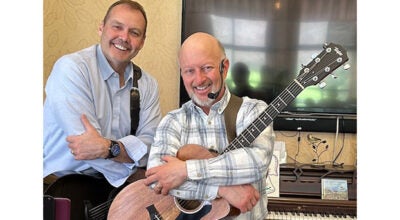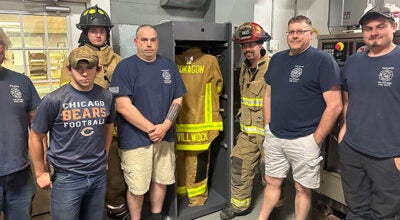The power of storytelling
Published 9:31 am Thursday, May 15, 2014

Attendees of Kim Weitkamp’s storytelling workshop work on a “memory map” exercise, jotting down a series of significant moments in time. (Leader photo/TED YOAKUM)
While it may seem rather self-serving for the professional storyteller to claim, Kim Weitkamp said that the effect a story could have someone’s life can be profound.
She can attest to this from her own experience with her father, Spike.
As a child, Spike was a stern figure, often reserved when showing his affections to her and her siblings, Weitkamp recalled. As a result, their relationship
remained warm, yet distant, as she grew older.
When she asked her father about the relationship he had with his parents, the answer she received radically altered her long held perception of him.
“I said, ‘Tell me a time when you were hugged by your mom or your dad where it really affected you,’” Weitkamp remembered asking. “My dad turned away and got quiet.”
Since then, the two have become even closer, all because of a few memories that her father shared with her.
Weitkamp shared this story while giving advice and guidance to a packed house at the COA’s Front Street Crossing Tuesday. The storyteller hosted a workshop for aspiring writers and orators as part of the 2014 Dogwood Fine Arts Festival, which continues through Sunday.
The Pennsylvania-native is the latest storyteller to be featured at the festival. Despite being a relative newcomer to the professional storytelling scene, Weitkamp has enjoyed a tremendous amount of success, releasing several records and earning a number of awards for her performances.
Weitkamp gave the workshop attendees several insights into how to become a more effective crafter of spoken tales, having them share their own memories with the rest of the class. She then showed them how they could map those experiences out, breaking down the characters, scenes and conflicts to discover the most compelling
narrative.
“It is so important, as an oral story teller, that every detail is in my brain as I tell it to you,” Weitkamp said. “All I’m doing is describing to you what I’m seeing in my brain. It helps make the story fuller.”
More importantly, though, Weitkamp told attendees about how useful these skills are, particularly when it comes to persuasion. An emotional story has a ripple effect that can change people’s perception of themselves and the world around them, which can generate a positive return to the person telling it, she said.
“[Companies] pay millions of dollars to learn this, and it’s a no-brainer,” Weitkamp said. “There are companies and people who pay a lot of money to learn how story affects the demographic of their customer base.”
Weitkamp pointed to studies that showed that families also benefit from story telling, as children who are exposed to personal tales have a strong set of values to draw upon when faced with adversity.
“The power of story is amazing to me,” she said. “I don’t do what I do just to entertain. And I try to alert people to the power of story, not so that I can scare you away from it, but so that you understand what you’re walking into. It’s a fabulous thing.”






